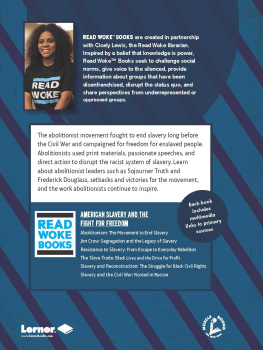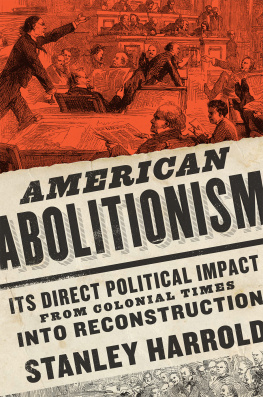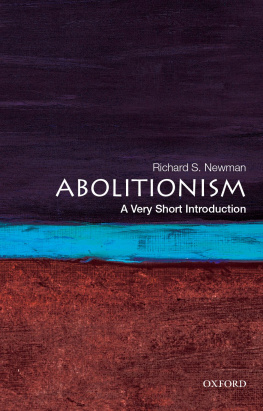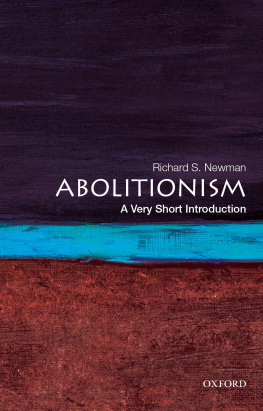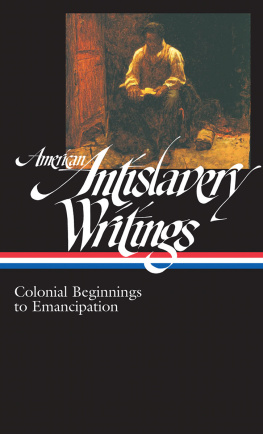Prophets of Protest
Prophets of Protest
Reconsidering the History of
American Abolitionism
EDITED BY
TIMOTHY PATRICK MCCARTHY AND
JOHN STAUFFER

Introduction and compilation 2006
by Timothy Patrick McCarthy and John Stauffer
Foreword 2006 by Michael Fellman
Afterword 2006 by Martin Duberman
Individual essays 2006 by each author
All rights reserved.
No part of this book may be reproduced, in any form, without written permission from the publisher.
Requests for permission to reproduce selections from this book should be mailed to: Permissions Department, The New Press, 38 Greene Street, New York, NY 10013
Published in the United States by The New Press, New York, 2006
Distributed by W. W. Norton & Company, Inc., New York
LIBRARY OF CONGRESS CATALOGING-IN-PUBLICATION DATA
Prophets of protest : reconsidering the history of American abolitionism /
Timothy Patrick McCarthy and John Stauffer, eds.
p. cm.
Includes bibliographical references and index.
ISBN-978-1-5955-8854-8
1. Antislavery movementsUnited StatesHistory. 2. AbolitionistsUnited
StatesHistory. 3. United StatesPolitics and government17831865.
I. McCarthy, Timothy Patrick. II. Stauffer, John.
| E441.P96 2006 |
| 973.7'114dc22 | 2005057661 |
The New Press was established in 1990 as a not-for-profit alternative to the large, commercial publishing houses currently dominating the book publishing industry. The New Press operates in the public interest rather than for private gain, and is committed to publishing, in innovative ways, works of educational, cultural, and community value that are often deemed insufficiently profitable.
www.thenewpress.com
Composition by dix!
24681097531
In memory of Herbert Aptheker and Benjamin Quarles
Contents
Michael Fellman
W riting in 1979, in the introduction to Antislavery Reconsidered, a collection of essays on American abolitionism, my colleague Lewis Perry and I suggested that, as an issue fraught with public implications, abolitionism disturbs the tidy balances between narrative and analysis, between moral judgment and dispassionate research. I am glad to report that Prophets of Protest, which appears, now, a full generation after our earlier book, continues to press the same unease on historians and their readers.
In antebellum America, slaverythe most highly exploitative form of labor extraction ever devisedwas deeply embedded into the fabric of the American capitalist economy. As a result, systemic racism was ingrained within an American caste system that has not gone away, emancipation notwithstanding. During the years between the American Revolution and the Civil War, most Americans either supported that system or looked the other way while profiting from it. Fueled by idealism and anger, however, the abolitionists, a small and despised minority, threw sand in the powerful machinery of public opinion. They refused to countenance the continuation of an institutional arrangement that gave lie to American pretenses that their nation represented the best hope of humankind for attaining republican liberty and true Christian fellow feeling.
Many historians writing in the first half of the twentieth century viewed the abolitionists as irrational extremists who refused to adjust to the American genius for gradual social change. Most of these scholars averted their gaze, whether they acknowledged it or not, from the apartheid system called segregation that had stripped African Americans of fundamental civil liberties and kept them in the social cellar through the continuous use of bigotry and discrimination, much of it by violent means. Even scholars with a more generous view of the abolitionists stressed the divisiveness between those who favored political action and those who insisted that moral separation from evil was the only way to destroy slavery. Much of the historical debate concerned which group of white male agitators followed the more effective path.
Starting in the late 1950s and continuing through the next decade, in tandem with the rise of the civil rights movement, many progressive historians reevaluated the abolitionists, even referring to the contemporary movement for change in Americas perception of race as the new abolitionism. Searching for a relevant past, historians reconsidered abolitionism as a nineteenth-century test case of the limits and possibilities of radicalism in America. Cast as progressive precursors, the abolitionists inspired many historians on the New Left to stress the continuity and passion of the American party of change. To do so required overlooking the long, fallow periods during which reform waned and a discriminatory status quo rode roughshod over people at the bottom of society, and glossing over abolitionist contradictions on race and economic change. But it was energizing all the same.
By the late 1970s, second thoughts had begun to complicate the generations of freedom fighters sensibility. Although there was certainly no return in the historiography to viewing the abolitionists as marginal extremists, many of us began to question the racial, social, and economic attitudes of the abolitionists themselves. In addition, we began to explore the connection and disconnection between abolitionism and the more morally ambiguous form of antislavery that shaped the Republican party as it worked to energize a majority among Northern white male voters in the late 1850s. Still, the core arguments among historians about abolitionism continued to stress the political engagement of a small but determined cadre of white male reformers.
The broader ground for contextualizing abolitionism was beginning to shift. Womens history, already flourishing, had broadened consideration of the abolitionist movement to include a (somewhat elitist) focus on the roles of leading white women abolitionists and their connection to feminism. On the whole, however, despite the pioneering efforts of such historians as Benjamin Quarles and Herbert Aptheker, the absence of scholarly work on black abolitionism continued to represent the most glaring gap in American history concerning abolitionism. Limitations notwithstanding, many of the contributors to Antislavery Reconsidered were starting to move toward what Perry and I then characterized as a reinvigorated study of the abolitionist movement whose importance derives not from its resemblance... to modern movements, but what it indicates about fundamental social conflict in a different historical era.
Although twenty-five years ago no one could fully anticipate where this call to reconsider the abolitionists within their own contexts might lead, Prophets of Protest provides just such a rich and probing unraveling of many of the interconnected strands of abolitionist culture. These essays illuminate much of the contested ideological ground the abolitionists tilled and describe many of the techniques the abolitionists used to energize themselves and to press for change in the midst of a reluctant and often hostile society.
Prophets of Protest strikingly repositions abolitionism as an African American and interracial movement, rather than merely a white one. Stemming from much recent work, and predicting where the field will continue to develop, these essays show many of the ways in which black leadership developed within the movement, and how the black rank and file became engaged in radical protest and reform. Concomitantly, some essays depict white women not just as leaders but as foot soldiers in a stirring social engagement. Popular forms of actionfestivals and picnics, autobiographical and political writings by black writers, photographic representations of black reformers, and abolitionist poetryare imaginatively explored in order to open up a richer understanding of abolitionist culture than earlier generations of historians had thought to explore.
Next page

